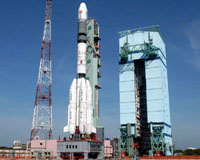 |
Bangalore, India (AFP) April 15, 2010 Indian space engineers lost contact with a rocket showcasing new indigenously built booster technology on Thursday soon after launch, in a major blow to the country's space ambitions. The launch of the first India-made rocket powered by cryogenic motors, a complex technology mastered by just five countries, failed soon after lift-off from India's space centre at Sriharikota in southeast Andhra Pradesh state. Indian Space Research Organisation (ISRO) chairman K. Radhakrishnan told reporters that the rocket began tumbling soon after launch "indicating the controllability was lost." Cryogenic boosters use supercooled liquid fuel and the technology has only been successfully developed by the US, Russia, France, Japan and China. India had previously imported seven cryogenic engines from Russia, using five of them to launch heavy satellites over the last decade. The technology is intended to launch heavier satellites into high orbits, about 36,000 kilometres (22,000 miles) from the earth, ISRO has said.
Share This Article With Planet Earth
Related Links Rocket Science News at Space-Travel.Com
 India Set For Critical Launch Of Upgrade Rocket System
India Set For Critical Launch Of Upgrade Rocket SystemBangalore (PTI) Apr 14, 2010 The stage is all set for India to test its first domestically developed cryogenic engine for the first time on the locally built GSLV-D3 rocket - with the countdown for the April 15 launch expected to begin on Wednesday at the Sriharikota spaceport on Andhra coast. "A 29-hour countdown is expected to start at 11.27 AM tomorrow for the launch of GSLV-D3 on Thursday at 4.27 PM," Indian Space ... read more |
|
| The content herein, unless otherwise known to be public domain, are Copyright 1995-2010 - SpaceDaily. AFP and UPI Wire Stories are copyright Agence France-Presse and United Press International. ESA Portal Reports are copyright European Space Agency. All NASA sourced material is public domain. Additional copyrights may apply in whole or part to other bona fide parties. Advertising does not imply endorsement,agreement or approval of any opinions, statements or information provided by SpaceDaily on any Web page published or hosted by SpaceDaily. Privacy Statement |